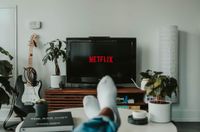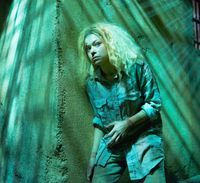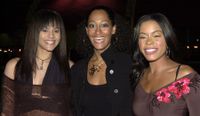Explore web search results related to this domain and discover relevant information.
List your movie, TV & celebrity picks.
Action comedy-spoof that follows ex-C. I. A. Agent and full-time ladies man, Black Dynamite, who's out to avenge the death of his brother against kung-fu masters, drug-dealing pimps, and The Man.CreatorsCarl JonesByron MinnsScott SandersStarsMichael Jai WhiteByron MinnsKym WhitleyA trio of black youths learn about life, love, friendship, credit cards, gambling, and a variety of other things while growing up in an inner city.StarsErnest ThomasHaywood NelsonDanielle SpencerA group of students at a historically Black university struggle to make it through college.CreatorBill CosbyStarsLisa BonetKadeem HardisonJasmine GuyThe everyday life and problems of the Josephs, a black family living in Chicago, Illinois.StarsRockmond DunbarDarrin Dewitt HensonAaron Meeks


Seen & Heard: The History of Black Television premieres September 9, 2025, on HBO and Max. Discover the untold stories and impact of Black creators and shows that shaped American TV history.
You can check it out on HBO Max’s YouTube, Instagram, and (for the old-school) even IMDb’s video section. Trust me, it’s the kind of trailer that’ll hit you right in the pride—shows the struggle, the humor, and the sheer energy behind making Black TV “seen and heard”.On regular TV? HBO, same time.It premiered first at the South by Southwest Festival way back in March 2025, but for regular folks—no badge required—September’s the magic date. AV Squad (@AVSquadLA) shared on Twitter that Seen & Heard, a two-part documentary exploring the history of Black representation on television, will premiere on HBO Max on September 9.
The two-part HBO documentary executive produced by Issa Rae and directed by Giselle Bailey and Phil Bertelsen isn't comprehensive, but it is interesting and moving.
Issa Rae, of “Insecure” fame, is an executive producer of (and a major figure in) a new two-part documentary, “Seen & Heard: The History of Black Television,” premiering Tuesday on HBO and streaming on HBO Max. Presented as a film by Giselle Bailey, with a directed by credit shared with Phil Bertelsen, it’s not a comprehensive accounting — any viewer who has watched much TV over the medium’s decades might have an opinion on what’s missing.Tyler Perry gets emotional with Oprah, remembering the bad old days, and shows the filmmakers around his Atlanta studio complex, with soundstages named after Black stars, including Oprah (stage No. 1, naturally), Denzel Washington, Cicely Tyson, Whoopi Goldberg, Ruby Dee and Ossie Davis. Oprah herself recounts her journey from rural poverty to “not good” TV news reporter to talk show host.Debbie Allen remembers Akil as an intern (“She used to park my car”). Waithe, seen addressing a class of aspiring writers, named her production company for Hillman, the college in the “Cosby” spinoff, “A Different World.” (“They weren’t afraid to be complicated.”) Rae was all about “Living Single”: “I consider [Kim Coles] one of the original awkward Black girls.” · The documentary reflects on mentors and mentees, like Debbie Allen, who recalls when Mara Brock Akil, now a TV writer and producer, was an intern.The series is discursive and selective, as it would have to be, given the size of the subject; it’s less about particular shows, most of which are touched on only lightly, than about cultural waves and the feast and famine cycles of Black TV.


Black-led TV and film projects are being cancelled due to streaming mergers, budget cuts, and corporate reshuffles, but there are still talented Black writers, directors, and actors creating stories that reflect the Black experience, and this fall there are five upcoming projects worth watching.
It highlights five upcoming TV and film projects that bring together talented Black writers, directors, and actors, including Abbott Elementary, Highest 2 Lowest, Tyler Perry's Beauty in Black, Reasonable Doubt, and HIM.Once upon a time, Millennials had a long list of iconic Black TV and films to watch. From the late ‘90s into the early 2000s, we had options, entire nights of television and movies that reflected our humor, struggles and joy.From Emmy-winning sitcoms to tense legal dramas, from intimate character studies to edge-of-your-seat thrillers, these five upcoming TV and film projects bring together some of the most talented Black writers, directors and actors working today.In theaters August 15 | Streaming on Apple TV+ September 5 ... Tyler Perry’s Netflix hit is back for season two after dominating the platform’s charts. The series dives into love, ambition and the challenges Black women face in business and relationships, all wrapped in Perry’s signature mix of drama, romance and unexpected twists.
The Black TV & Film Collective started in 2015 with a small group of artists on a mission: friends helping friends create their projects. What started as a simple act to create work, given the dearth of opportunities for Black filmmakers, eventually blossomed into a dynamic and effective meetup ...
The Black TV & Film Collective started in 2015 with a small group of artists on a mission: friends helping friends create their projects. What started as a simple act to create work, given the dearth of opportunities for Black filmmakers, eventually blossomed into a dynamic and effective meetup group.BTFC members work in front of the camera, behind the camera, and everywhere in between. Presently, we have members in 5 major media centers in North America: New York, Los Angeles, Atlanta, Raleigh and Toronto. As we grow, what continues to be at the heart of the Black TV & Film Collective, is friends helping friends create.Today, with over 1300 members in major media hubs across North America, the Black TV & Film Collective is a development and production hub for Black and brown content creators and professionals. BTFC has supported over 200 projects since its founding in 2015.She is a 2018 Sundance Creative Producing Fellow and recipient of the 2020 Sundance Creative Producing Award for Farewell Amor, which premiered at the 2020 Sundance Film Festival in US Dramatic Competition. Huriyyah is also co-founder of the Black TV & Film Collective, a 1400-member 501c3 dedicated to developing and supporting artists of color.
From A Different World to Insecure and Girlfriends: these are the shows that have singlehandedly defined the culture.
No show on television today has captured the modern Black millennial experience quite like the hit HBO series. Starring Rae as Issa Dee, Yvonne Orji as the neurotic Molly, Natasha Rothwell as the hilarious Kelli, and Jay Ellis as Lawrence, the series follows the a group of Los Angeles based friends who weave in and out of each other’s lives as they reckon with love, adulthood, and the growing pains that come with it all. Along with a standout comedic cast, the series maintains one of the best TV soundtracks of all time.Set in Detroit, Michigan, Martin is heralded as one of the formative Black TV comedies of our time. Starring comedian Martin Lawrence, the series follows his life as a disc jockey living with his girlfriend Gina (Tisha Campbell) and their everyday antics with their crew of friends.Comedian Michelle Buteau stars as Mavis Beaumont, a burgeoning Brooklyn based fashion stylist working to revamp her life and career after undergoing a traumatic breakup. The Netflix series is a breath of fresh air in the Black TV canon thanks to it not being afraid to embrace queer characters and having a plus-size actress maintain an exciting on-screen love life.The world of Black TV has also granted us some of Hollywood's biggest stars; Will Smith, Kerry Washington, Issa Rae, Tracee Ellis Ross, and more are all products of the expansion of Black TV.


In 2013, the Canadian sci-fi drama Orphan Black premiered in the United States as a BBC America original series. The series soon turned into one of BBC America's biggest hits while making Tatiana Maslany into an Emmy-winning star. Orphan Black ran for five seasons on BBC America, and now it's ...
In 2013, the Canadian sci-fi drama Orphan Black premiered in the United States as a BBC America original series. The series soon turned into one of BBC America's biggest hits while making Tatiana Maslany into an Emmy-winning star. Orphan Black ran for five seasons on BBC America, and now it's finally arrived on Netflix eightOrphan Black ran for five seasons on BBC America, and now it's finally arrived on Netflix eight years after it came to an end.To mark the arrival of this modern sci-fi classic, Watch With Us is sharing three reasons why you should watch Orphan Black on Netflix in September.The opening episode of Orphan Black carefully lines up the story of con artist Sarah Manning (Maslany), a woman who witnesses the death of Beth Childs (Maslany), a woman who looks almost identical to her.

Meet the top black British TV presenters. They include Sir Trevor McDonald, Diane-Louise Johnson, Ade Adepitan, Alex Scott, and June Sarpong.
McDonald did not attend university; he started working as a journalist for local radio stations, TV, and newspapers in Trinidad. He later moved to London, working for the BBC World Service before joining ITN, where he became the organisation’s first black reporter.Angelica Bell is a British TV presenter who is also famous for winning the 2017 edition of Celebrity MasterChef. Image: X/@angellicabell ... Education: BA in politics at the University of the West of England. · Ethnicity: Black (Caribbean – St.Besides her work as a TV and radio presenter, she is a regular feature in reality TV shows and is famous for winning the 2017 edition of Celebrity MasterChef · Charlene White was the first black woman to host ITV News at Ten.Charlene White is another prominent black British TV presenter. She is a trailblazer, with outstanding achievements including being the first black woman to host ITV News at Ten and being part of the first all-black panel on Loose Women.

From 'Good Times' to 'Insecure', Black TV has faced cancellations and comebacks. HBO’s 'Seen & Heard' explores the past, present and future of our stories.
Issa Rae’s HBO doc 'Seen & Heard' examines the history of Black TV, from cancellations and golden eras to what comes next.The show, which was a success when it aired, has since become a classic, added to the list of “must-watch” Black TV to validate your Black card. But its final season wasn’t the triumph viewers had hoped for. During the show’s eighth season, it was interrupted due to the 2007 writers’ strike.From the struggle for acceptance in the 1950s to the abundance (but often early cancellation) of Black shows in the 1990s, a respectable resurgence emerged in the early 2010s. This journey through TV history is explored in the upcoming documentary series Seen & Heard.Black people had power and budgets on a wide scale, maybe for the first time since the advent of the medium. · Marcus Jones, awards editor of TV & film at IndieWire, says that smaller networks were targeting Black audiences to differentiate themselves from bigger ones.
Welcome to 365BLK, your all-new TV network for the best in African American movies and TV series. 365BLK broadcasts over-the-air so you can watch it for FREE with a TV antenna. Click "FIND US" below to see the very best in Black entertainment.
365BLK is a television network featuring the best in African American movies and TV series. 365BLK broadcasts free over-the-air to anyone with a TV antenna.
Watch FREE unlimited Black films and TV shows on FilmRise Black TV with no subscription or login needed! FilmRise Black TV offers a dynamic collection of powerful films and thought-provoking TV shows, highlighting the richness of Black culture, history, and storytelling.

Watch the best in Black TV & film with new and exclusive content added weekly!
ALLBLK - Stream where you're celebrated
Formerly known as UMC since its launch in November 2014, ALLBLK continues to be the first and best streaming service ever created for Black TV and film.
Now with an all new name, a fresh look, and a long list of new originals and exclusives on the way, consider this your invitation to stream Black better than ever before with a world of streaming entertainment that is inclusively, but unapologetically – Black.ALLBLK - Stream where you're celebrated


Oh, no! You turned on your TV, and the screen is black! What causes a blank tv screen, and what can you do to fix it? We tell you everything you need to know.
After a long, hard day, you finally sit down to catch up on your favorite show. But when you hit the power button on your remote control, your TV screen stays black! You try pressing the remote’s power button again and again from every angle, but still, your TV has no picture.If your TV screen goes black but the sound still works, check the input source to ensure it is turned on and operating correctly. This includes external devices like cable boxes, video game consoles, laptops, and streaming devices. Once you’re sure the input source is working properly and you have the right input settings, check the cable connections.With a good connection, the cable shouldn’t feel loose or easily disconnect when pulled on or moved around. If all your cables have a snug fit, but the problem persists, try connecting the device to another TV. If your TV screen is still blacked out, you may need new cables.Display settings are TV options that allow you to control the visual output of your screen. These settings can vary depending on the television’s make and model, but they typically include options like Brightness, Contrast, Sharpness, and Aspect Ratio. Sometimes, tinkering with display settings can inadvertently lead to a black screen.
The Black TV & Film Collective facilitates career-advancing opportunities for creators of Black and African descent to achieve financial sustainability within the entertainment industry. We provide critical production support that empowers our members to turn their creative and professional ...
The Black TV & Film Collective facilitates career-advancing opportunities for creators of Black and African descent to achieve financial sustainability within the entertainment industry. We provide critical production support that empowers our members to turn their creative and professional abilities into enriching careers, as well as expand their network.Want to know what goes into making amazing children’s TV?

The S90D uses a QD-OLED screen to enable pixel-level contrast control and a wide range of colors. This gives the TV deep black levels that avoid the washed-out and uneven look that some QLED and LED sets have in dark scenes.
The G5 is LG's latest flagship OLED TV. Like all OLED displays, it provides an infinite contrast ratio with deep black levels, but this model can also get exceptionally bright, beating every other OLED I've tested.Though some QLED TVs can get even brighter, they lack the pixel-level contrast control that the G5's OLED panel enables. Check out our QLED vs OLED comparison for more details. This combination of high brightness and high contrast creates a nearly flawless image with black levels that disappear into a dark room and bright elements that shine with precision, free from any backlight imperfections like blooming or vignetting.However, the QM8K has a more advanced backlight with more dimming zones, which helps it achieve a much brighter image with even better black levels. Our reviewer measured a peak of 3,648 nits on a 10% window, which makes the QM8K the brightest TV in this guide and one of the brightest TVs on the market.Check out our guide to the best TCL TVs. ... Samsung's high-end S95D uses a unique matte screen that can nearly eliminate glare and reflections. It's also the brightest OLED we've ever tested. However, the anti-glare design can give black levels a slightly faded look in bright rooms.

In the 1940s and 1950s, black and white television sets became a common fixture in households across the country. Families gathered around the TV to watch their favorite programs, from comedies to dramas to live sporting events.
Television has come a long way since its humble beginnings in the early 20th century. From the grainy black and white images of the 1930s to the crystal clear high definition pictures of today, the evolution of television has been nothing short of remarkable.The first television broadcasts began in the late 1920s, with experimental programming being broadcast in black and white. The quality of these early broadcasts was far from perfect, with fuzzy images and poor sound quality.Television has come a long way since its early days of black and white broadcasts. From the grainy images of the 1930s to the crystal clear pictures of today, the evolution of television has been nothing short of remarkable. As technology continues to advance, the future of television looks bright, with new technologies such as UHDTV, 3D, and virtual reality promising to revolutionize the viewing experience once again.By sergiokatoSeptember 9, 2025Leave a Comment on The Evolution of Television: From Black and White to High Definition
List your movie, TV & celebrity picks. ... New players offer a modern-day examination of Black culture through the prism of pro football, while trying to keep their souls as they play The Game.CreatorMara Brock AkilStarsWendy Raquel RobinsonAdriyan RaeVaughn W.
A drug lady that rules a tight house and will kill or have someone slaughtered without getting her hands dirty.CreatorChristian KeyesStarsSkyh BlackEva MarcilleCandace MaxwellRailway workers from both Canada and the United States joined together to give birth to the world's first Black union.CreatorsArnold PinnockBruce RamsayAubrey NealonStarsAml AmeenRonnie RoweMouna Traoré


"Seen and Heard: The History of Black Television" features media icons such as Oprah Winfrey, Tyler Perry, Tracee Ellis Ross, Norman Lear and Shonda Rhimes.
Award-winning actor producer and writer Issa Rae is opening up about what inspired her new documentary, "Seen and Heard: The History of Black Television." She's executive producer of the two-part series that explores the history of Black representation on TV and how Black artists and creators revolutionized the industry while confronting major challenges.In the 2010s, "there were just so many new shows, new shows of color," she said. But now, Rae said TV and media is once again in an era where Black characters and shows have disappeared."What inspired me to even get my start was just seeing the people that I love, the people that I know, the people that raised me on TV, and that representation was so essential for me to recognize that I could do it," Rae told "CBS Mornings" Tuesday about her inspiration growing up in the 90s. In the early 2000s, Rae said there was a "disappearance all of the sudden" of Black characters and shows on TV, but they reemerged about a decade later.Issa Rae explores history of Black representation in TV in new documentary

The two-part HBO documentary executive produced by Issa Rae and directed by Giselle Bailey and Phil Bertelsen isn't comprehensive, but it is interesting and moving.
Issa Rae, of “Insecure” fame, is an executive producer of (and a major figure in) a new two-part documentary, “Seen & Heard: The History of Black Television,” premiering Tuesday on HBO and streaming on HBO Max. Presented as a film by Giselle Bailey, with a directed by credit shared with Phil Bertelsen, it’s not a comprehensive accounting — any viewer who has watched much TV over the medium’s decades might have an opinion on what’s missing.Tyler Perry gets emotional with Oprah, remembering the bad old days, and shows the filmmakers around his Atlanta studio complex, with soundstages named after Black stars, including Oprah (stage No. 1, naturally), Denzel Washington, Cicely Tyson, Whoopi Goldberg, Ruby Dee and Ossie Davis. Oprah herself recounts her journey from rural poverty to “not good” TV news reporter to talk show host.Debbie Allen remembers Akil as an intern (“She used to park my car”). Waithe, seen addressing a class of aspiring writers, named her production company for Hillman, the college in the “Cosby” spinoff, “A Different World.” (“They weren’t afraid to be complicated.”) Rae was all about “Living Single”: “I consider [Kim Coles] one of the original awkward Black girls.” · The documentary reflects on mentors and mentees, like Debbie Allen, who recalls when Mara Brock Akil, now a TV writer and producer, was an intern.The series is discursive and selective, as it would have to be, given the size of the subject; it’s less about particular shows, most of which are touched on only lightly, than about cultural waves and the feast and famine cycles of Black TV.




